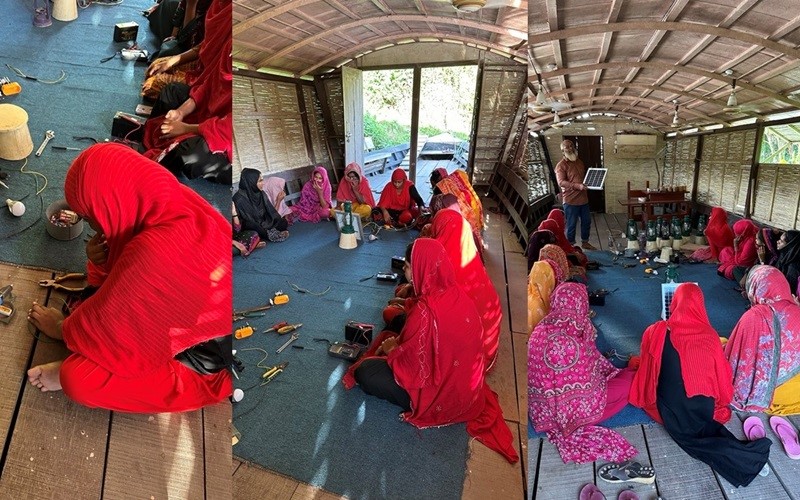
By Dr Jyotsna Jha
Director Skills, Commonwealth of Learning*
“For the first time, I bought two sets of clothes for my husband and children, using my self-earned money”, shared Afsana with pride and joy. Afsana Begum, 44, and her daughter-in-law, Zeenat, 24, live in a village close to Damkura in the Rajshahi district of Bangladesh. Together, they did the tailoring course offered by the Centre for Mass Education in Science (CMES), one of COL’s partners for the Empowering Women and Girls (EWG) project. Together, they earn about 5,000 Bangladeshi Taka per month (nearly CAD 60), which acts as ‘an additional income in cash’. They use this to supplement the earnings of their husbands, father and son, who work as daily wage agricultural labourers and masons. Afsana had taken a loan to buy the sewing machine, which she is regularly paying back in monthly instalments. The joy of having her ‘own’ income and the ability to spend it as per her own wish was written large on her face.
Shabana Akhtar, 24, had a similar story to share. She, too, works as a home-based tailor and earns about 2,500-3,000 Taka (about CAD 30-35) per month. She saves money by stitching clothes for her two little daughters and considers that as additional income as well. She was studying in Grade 10 when she was married off and had to stop going to school. Her income is low as compared to her husband, who earns about 650 Taka (~CAD 8) per day, but it allows her to save and use it for things of her own choice. On the other hand, for 19-year-old Amina Khatun, who works in a tailor shop on a piece-rate basis and manages to earn about 300-350 Taka (~CAD 3-5) per day, it is her only income. She got married when she was 15 and had completed Grade 8 education, but her husband divorced her two years later.
Shakila, Mehar and Sona, who reside in flood-prone areas of Natore district and attended their tailoring course in a floating school run in the boats by another of COL’s partners in Bangladesh, Shidhulai Swanirvar Sangstha (SSS), had similar experiences to share. Shakila bought a sewing machine by borrowing 7,000 Taka, which she is repaying about 500-700 Taka every month out of a monthly earning of about 3,000 to 4,000 Taka. Mehar’s story is not very different, nor is Sona’s. They run a tailoring shop which they started after receiving the SSS training under the EWG project in their respective homes and earn an income of their own, which helps them meet some of the important expenditure needs, given that ‘prices have gone up so much’.
While the tailoring course is giving opportunity largely to those women who had lost their chances of continuing schooling due to family and societal circumstances, the computer training, also provided by COL’s partners under the same project is supporting many young girls to add the digital skills to their portfolio. Shamina, who works in a bank near Gobratola as a computer operator, earns about 3,000 Taka per month (~CAD 30-40), and she is also studying at the local college for her undergraduate degree. She is happy as this earning helps her pay for her education and provides her with some pocket money. She thinks she would be much better prepared for higher-paying jobs after her college education because of the training and work experience that she has been able to access because of this project.
Computer training also helps in connecting these girls to the outside world using the internet. The specially designed boats that house the boat schools run by SSS have three to four sections, where the main hall is used as a classroom, while on both sides, there are additional spaces that are used for the purposes of the library or resource room. Here, the small groups of two girls take turns accessing the internet to read news or to gather information about various job and trade opportunities.
Training on preparing vermicompost combines skills and knowledge on sustainable agriculture. Shama Parveen, who received training at the CMES-run Training Centre, prepares vermicompost on a bigger scale and uses it for her own fields and supplies to others. It secures higher prices than the chemical manure and the costs are not high if they keep reproducing vermin and use the wastes generated on their own land and cattle farm. Her son has also learnt from her and helps her in this initiative. The demand is not a big issue, she thinks, as the awareness about such manure is on the rise.
The SSS uses its long experience in promoting renewable energy in the form of a training programme for girls and women to make solar energy-based lanterns in the EWG project. The training takes place in boat schools, where girls enjoy themselves and learn the science and technique of this process hands-on. This skill, in addition to the ability to question gender stereotypes, has good business prospects through e-commerce as parts are available within the country.
The EWG approach combines training on skills with training on human and gender rights while working with a range of stakeholders, including men, young boys and religious leaders. The holistic approach has helped in garnering wider support for women’s work and empowerment, and in enabling a general atmosphere of change. This ecosystem approach, along with the credible presence of partners in their respective areas, is also creating a potential for sustainability of the change process in future.
With funding from Global Affairs Canada, COL initiated a three-year project – ‘Empowering Women and Girls in the Commonwealth’. This project aims to improve the realisation of human rights for women and girls from disadvantaged communities in selected areas of five Commonwealth counties, including Bangladesh.
*Based on site visits in Bangladesh during July 12-18, 2024. Please note that pseudonyms are used in the blog to protect the identities of the women/girls.


